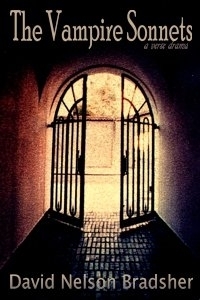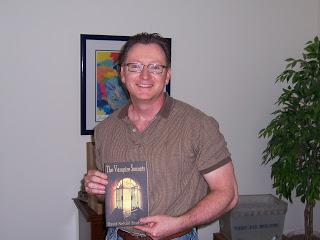Guest Blogger, David Nelson Bradsher, Author of The Vampire Sonnets
Today, I'm very excited to welcome David Nelson Bradsher the author of The Vampire Sonnets. I was privileged to meet him and hear him read some of his beautiful sonnets at A Mystical day of Bloodlust in Lexington Kentucky. Being a lover of poetry, I very much enjoyed the poems and chatting with David about Lord Byron and Shakespeare, among other things. I was intrigued by the story the sonnets presented. Vampires and poetry seem like the perfect marriage to me. I think you will find David's work as exciting and innovative as I did. David is also offering a copy of his book in a drawing. Please read on for entry details.

Denise, thank for the invitation to be your guest blogger for the week. It's great to be here to talk a little about The Vampire Sonnets, my new verse drama from Nelson Pearl Publishers.
The Vampire Sonnets is one of those projects that more or less occurred rather than being planned. I call it a happy accident. I'd written a single sonnet, based on the image of the sun being a portal to flame, and it just made sense to couch it as a fourteen-line snapshot of a vampire, a vampire so immersed in his feeding of a serving wench that he doesn't notice the sun rising behind him. The sonnet ended with him having to seek sanctuary in the cool earth of a forest floor, and my intent was to leave it at that.
Therein, I located the happy accident, ripe for the picking. A British friend of mine, a writer of prose, read the sonnet and told me he'd like to hear the "resolution" of the immortal's plight. Not wanting to disappoint an interested party (poets dream of such an audience), I wrote another; then four; then eight; then sixteen, etc., and before I came up for air I had a full-fledged verse drama before me.
So, what we have now is a set of 193 sequential Shakespearean sonnets that tell the story of Tristan Grey, a 19th Century Londoner who is unwittingly led into the Chelsea clan by Nina, a psychotic ancient vampiress from Russia. What begins as a vampire seeking shelter from the sun transitions into an immortal review of his second life, complete with episodes of his siring, his relations, victims, loves and needs. It's a novel in the sense that it tells a story, but what sets it apart is the fact that the entire tale is written in rhyme and meter, with each chapter consisting of three quatrains and a couplet, and then moving immediately into the next chapter, which may be a continuation of the episode, or a change in time or setting, depending on the circumstance.
Many people are curious as to how you write such a story and stay true to the poetic form, but still achieve the freedom necessary to tell the tale in an unfettered manner. The best answer I can come up with is that it takes time, patience, and not a small dose of madness to grind the gears until it reads smooth enough to satisfy a perfectionist. Truth be told, I could have worked on this for forty years and still found things to change, but at some point you have set your fledgling free, and (with the help of my angel/devil of an editor/publisher) I finally signed off and let the presses roll.
I'd love to know from your readers, Denise, if the idea of a story told entirely in sonnets is off-putting or intriguing, and if those who haven't had much experience with poetry would still give it a day in court? I can pretty much guarantee that if a reader takes his or her time, follows the punctuation with minimal attention to the line breaks and maximum attention to the story, there's something there for lovers of poetry, paranormal, romance and mystery.
I appreciate the opportunity to be here, and I'd love to hear from the readers, if they have any questions or comments. To spark some interest, I'd also like to offer a free book, determined by a random drawing, to be awarded at the end of a week's time. Thanks again for letting me be here, and I hope to hear from some of you. For those interested in purchasing the book, please visit www.nelsonpearlpublishers.com. Please also feel free to visit the Facebook group page at http://www.facebook.com/home.php#!/group.php?gid=47383438565.

David Nelson Bradsher graduated from the University of North Carolina-Chapel Hill ('89 B.A. English). He is a metrical poet, a late-arriving disciple of verse, and he still believes in the traditional forms, its meters, and rhyme's ability to capture the reader's ear and memory with an accordance of sound and music. He makes his home in Raleigh, North Carolina.
David, thanks so much for being my guest! Readers, please leave a comment for David to enter the drawing. The drawing ends 11/19/10, 11:59 PM EST. Winner will be announced the next day.
If you'd like to learn more about the world of Immortyl Revolution, please visit http://deniseverricowriter.webs.com/bookthreefreeread.htm.


Denise, thank for the invitation to be your guest blogger for the week. It's great to be here to talk a little about The Vampire Sonnets, my new verse drama from Nelson Pearl Publishers.
The Vampire Sonnets is one of those projects that more or less occurred rather than being planned. I call it a happy accident. I'd written a single sonnet, based on the image of the sun being a portal to flame, and it just made sense to couch it as a fourteen-line snapshot of a vampire, a vampire so immersed in his feeding of a serving wench that he doesn't notice the sun rising behind him. The sonnet ended with him having to seek sanctuary in the cool earth of a forest floor, and my intent was to leave it at that.
Therein, I located the happy accident, ripe for the picking. A British friend of mine, a writer of prose, read the sonnet and told me he'd like to hear the "resolution" of the immortal's plight. Not wanting to disappoint an interested party (poets dream of such an audience), I wrote another; then four; then eight; then sixteen, etc., and before I came up for air I had a full-fledged verse drama before me.
So, what we have now is a set of 193 sequential Shakespearean sonnets that tell the story of Tristan Grey, a 19th Century Londoner who is unwittingly led into the Chelsea clan by Nina, a psychotic ancient vampiress from Russia. What begins as a vampire seeking shelter from the sun transitions into an immortal review of his second life, complete with episodes of his siring, his relations, victims, loves and needs. It's a novel in the sense that it tells a story, but what sets it apart is the fact that the entire tale is written in rhyme and meter, with each chapter consisting of three quatrains and a couplet, and then moving immediately into the next chapter, which may be a continuation of the episode, or a change in time or setting, depending on the circumstance.
Many people are curious as to how you write such a story and stay true to the poetic form, but still achieve the freedom necessary to tell the tale in an unfettered manner. The best answer I can come up with is that it takes time, patience, and not a small dose of madness to grind the gears until it reads smooth enough to satisfy a perfectionist. Truth be told, I could have worked on this for forty years and still found things to change, but at some point you have set your fledgling free, and (with the help of my angel/devil of an editor/publisher) I finally signed off and let the presses roll.
I'd love to know from your readers, Denise, if the idea of a story told entirely in sonnets is off-putting or intriguing, and if those who haven't had much experience with poetry would still give it a day in court? I can pretty much guarantee that if a reader takes his or her time, follows the punctuation with minimal attention to the line breaks and maximum attention to the story, there's something there for lovers of poetry, paranormal, romance and mystery.
I appreciate the opportunity to be here, and I'd love to hear from the readers, if they have any questions or comments. To spark some interest, I'd also like to offer a free book, determined by a random drawing, to be awarded at the end of a week's time. Thanks again for letting me be here, and I hope to hear from some of you. For those interested in purchasing the book, please visit www.nelsonpearlpublishers.com. Please also feel free to visit the Facebook group page at http://www.facebook.com/home.php#!/group.php?gid=47383438565.

David Nelson Bradsher graduated from the University of North Carolina-Chapel Hill ('89 B.A. English). He is a metrical poet, a late-arriving disciple of verse, and he still believes in the traditional forms, its meters, and rhyme's ability to capture the reader's ear and memory with an accordance of sound and music. He makes his home in Raleigh, North Carolina.
David, thanks so much for being my guest! Readers, please leave a comment for David to enter the drawing. The drawing ends 11/19/10, 11:59 PM EST. Winner will be announced the next day.
If you'd like to learn more about the world of Immortyl Revolution, please visit http://deniseverricowriter.webs.com/bookthreefreeread.htm.
Published on November 12, 2010 00:15
No comments have been added yet.
Immortyl Revolution
Author of Cara Mia, Book One of the Immortyl Revolution the first of a new vampire series.
- Denise Verrico's profile
- 51 followers



